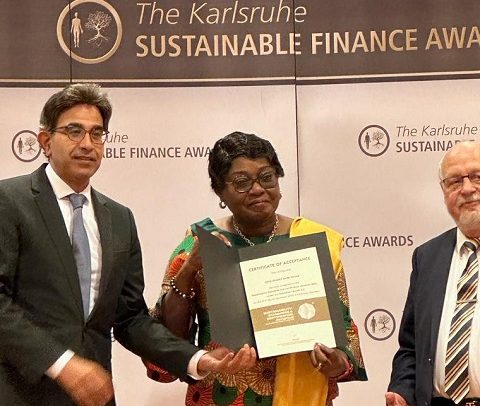Displaying the certificate is Ambassador Blay flanked by Arshad Rab, Chairman International Council of Sustainability Standards and CEO European Organization for Sustainable Development (EOSD), and Tom Hoyem, Board Member EOSD International Council of Sustainability Standards for Value-Driven Financial Institutions and Ex-Cabinet Minister, Kingdom of Denmark, Member of the City Council of Karlsruhe
THE DEVELOPMENT Bank Ghana (DBG) has been awarded a certificate of acceptance into the Sustainable Standards and Certification Initiative (SSCI).
The SSCI ensures the delivery of a holistic, robust, and locally-sensitive set of standards that aim to make value-driven financial institutions more resilient and profitable.
The award, thus provides DBG with new opportunities for mobilising funds to finance businesses and sustainable projects that will have a positive impact on the socio-economic and environmental development of the country. It will also ensure that the work and strategy of DBG are congruent with the global Sustainable Development Goals (SDGs), of which President Akufo-Addo, serves as a co-chair for the Advocates.
Ghana’s Ambassador to Germany, Gina Blay, received the certification on behalf of the CEO of DBG, Kwamena Duker, at the Global Sustainable Finance Conference 2022 held in Karlsruhe, Germany.
She said the admission of DBG to the SSCI has paved the way for DBG to become a catalyst in sustainable industrialisation in Ghana, and a major contributor to the promotion of entrepreneurship towards a high value-added economy that the country strives to achieve.
“The bank recognises that acceptance into a leading accreditation forum and the certification would inure to its benefit and provide an incentive for further achievements, while not relenting in efforts in deepening investments in the area of sustainability,” she stated.
Ambassador Blay said Ghana recognised the private sector as the engine of growth and has, therefore, put in place measures to continue to create an enabling environment for businesses in the country to flourish.
She explained that the DBG was setup by the government in November 2021, as Ghana’s new development finance institution that seeks to improve financing and technical support to the private sector through the acceleration of inclusive and sustainable economic transformation.
“Within a year, DBG has built a dedicated ESG, Sustainability and Climate Finance Team responsible for oversight of ESG and sustainability and ensuring that the bank is well-positioned to implement and execute the necessary processes and procedures required by local and international sustainability standards. The bank has undertaken numerous ESG awareness and specialist training to ensure that all its employees are educated and informed about the key tenets of ESG and Sustainability,” she said.
Ambassador Blay further noted that in September 2022, DBG signed onto the United Nations Global Compact Initiative, becoming the first Ghanaian financial institution to achieve the feat.
“The move was part of the bank’s efforts to promote and protect human rights, labour interests, the environment and anti-corruption principles through its business practices,” she said.
She expressed gratitude to the Association of African Development Finance Institutions (AADFI), the CEO of Uganda Development Bank, Patricia Ojangole, for their immense and continuous support throughout the process, and also the CEO of the European Organisation for Sustainable Development, Arshad Raab, as well as the International Council of Sustainability Standards for Value-Driven Financial Institutions, once again for the recognition.
Ambassador Blay reiterated that the certification and the afore-mentioned endorsement, accordingly demonstrated the level of commitment of DBG to integrating sustainability standards in its operations and, importantly, advocating the adoption of principles of sustainability in the financial environment in Ghana.
“I believe DBG will leverage the immense value from the SSCI process in creating DBG’s Purpose Statement and High Impact Goals,” she added.
BY Jamila Akweley Okertchiri

